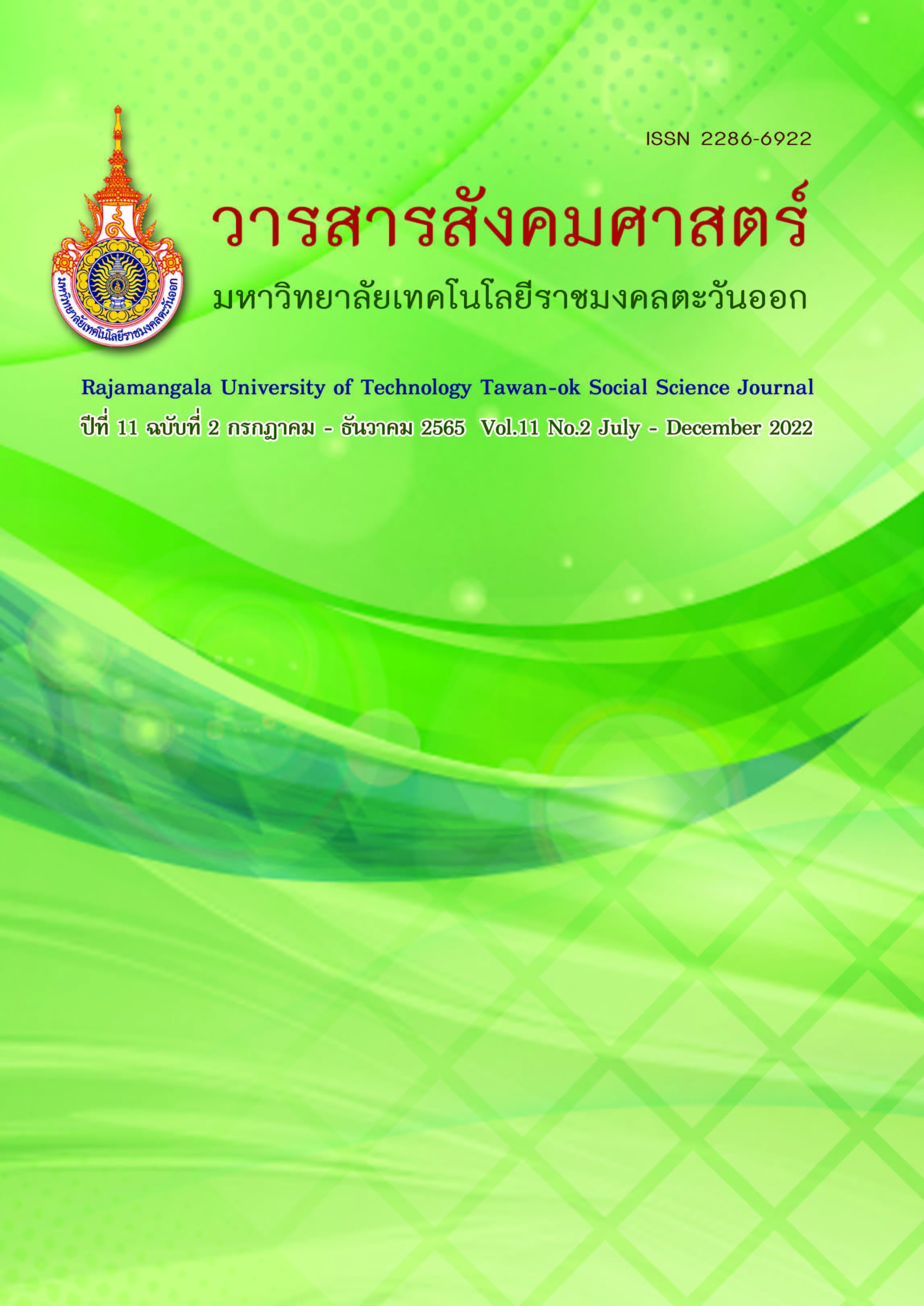Service Innovation Management Model for Hotel Business in Thailand
Main Article Content
Abstract
This academic articles presents an innovative service management model for hoteliers in Thailand facing a changing environment and increasingly intense competition from internal competition and from new hoteliers. come from other types of businesses that have stepped in to compete for market share as a result, hotel owners have to try to adapt to survive by finding strategies that will help strengthen their competitiveness and develop competitiveness for hoteliers by applying service innovations to differentiate themselves. Different outstanding to meet customer needs and create competitive advantage. through creating innovations that are valued for customers and economic value. To create a successful service innovation requires design that focuses on 1) balancing the use of technological innovations 2) delivering value to customers that come from demand. including taking into account the economic value of the hotel owner; 3) the degree of innovation being dependent on the organization's potential and capability, and 4) the appropriate strategy for personnel potential development.
Article Details

This work is licensed under a Creative Commons Attribution-NonCommercial-NoDerivatives 4.0 International License.
References
กรมท่องเที่ยว. 2564. รายงานการวิจัย เรื่องข้อมูลแหล่งท่องเที่ยวในประเทศไทย. กรุงเทพมหานคร: กระทรวงการท่องเที่ยวและกีฬา.
กรมท่องเที่ยว. 2562. สถิตินักท่องเที่ยวชาวต่างชาติที่เดินทางเข้าประเทศไทย. กรุงเทพมหานคร: กระทรวงการท่องเที่ยวและกีฬา.
กรมการท่องเที่ยว. 2564. สรุปสถานการณ์นักท่องเที่ยวปี 2563. กรุงเทพฯ: กรมการท่องเที่ยว กระทรวงการท่องเที่ยวและการกีฬา.
กระทรวงเทคโนโลยีสารสนเทศและการสื่อสาร. 2564. เทคโนโลยีการท่องเที่ยว. กรุงเทพมหานคร: สำนักงานส่งเสริมเทคโนโลยีสารสนเทศและ
การสื่อสารแห่งชาติ.
กระทรวงการท่องเที่ยวกีฬา. 2564. ยุทธศาสตร์การท่องเที่ยวไทย พ.ศ. 2558-2564. กรุงเทพมหานคร: กระทรวงการท่องเที่ยวกีฬา.
การท่องเที่ยวแห่งประเทศไทย จุฬาลงกรณ์มหาวิทยาลัยและสภาอุตสาหกรรมการท่องเที่ยวแห่งประเทศไทย. 2564.ดัชนีความเชื่อมั่นผู้ประกอบการธุรกิจการท่องเที่ยวในประเทศไทย. กรุงเทพฯ: จุฬาลงกรณ์มหาวิทยาลัย.
ศูนย์วิจัยธนาคารกสิกรไทย. 2564. ธุรกิจโรงแรมปรับตัวรับโอกาสและความท้าทายปี 2564. กรุงเทพมหานคร: ธนาคารกสิกรไทย.
สภาอุตสาหกรรมท่องเที่ยวแห่งประเทศไทย. 2564. รายงานประจำปีสภาอุตสาหกรรมท่องเที่ยวแห่งประเทศไทย 2563. กรุงเทพมหานคร. สถานที่พิมพ์.
องค์การการท่องเที่ยวโลกแห่งสหประชาชาติ (United Nations World Tourism Organization: UNWTO).2022.อุตสาหกรรมการท่องเที่ยวของทุกประเทศทั่วโลก. เข้าถึงเมื่อ 2 เมษายน พ.ศ.2565จาก http://www.tourism.go.th/view/2/International-Tourism_Cooperation/% /EN-US#
Bisbe, J. and P. Sivabalan. 2017. Management control and trust in virtual settings: A case study of a virtual new product development team. Management Accounting Research (December):12-29.
Brunswicker, S. 2016. Managing Open Innovation in Small and Medium-Sized Enterprises (SMEs). Open Tourism.
Open Innovation, Crowd sourcing and Co-Creation Challenging the Tourism Industry. 1sted. Springer.
Carpenter, M. A. and Fredrickson, J. W. 2018. Top management teams, global strategic posture, and the moderating role of uncertainty. The Academy of Management Journal 44 (3): 533-545.
Divisekera, S. & Nguyen, V. K. 2018. Determinants of innovation in tourism evidence from Australia. Tourism Management, 67, 157-167.
Flor, M. L., Cooper, S. Y., & Oltra, M. J. 2018. External knowledge search, absorptive capacity and radical innovation in high-technology firms. European Management Journal, Vol. 36 No. 2, pp. 183-194.
Gomezelj, D. O. 2016. A systematic review of research on innovation in hospitality and tourism. International Journal of Contemporary Hospitality Management, Vol. 28 No. 3, pp. 516-558.
Holden, A., and Fennell, D. eds. 2013. The Routledge handbook of tourism and the environment. Routledge Handbooks. New York: Routledge.
Khatri, I. (2018). Innovation research in tourism business: A review from two decades of studies. Journal of Tourism, XIX (1), 15-27.
Lin, S. 2016. The critical success factors for a travel application service provider evaluation and selection by travel intermediaries. Tourism management, 56, 126-141.
Maráková, V., and Medveová, M. 2016. Innovation in tourism destinations. Forum Scientiae Oeconomia Volume 4 No. 1, pp. 33-43
Pikkemaat, B., and Peters, M. 2016. Open innovation: A chance for the innovation management of tourism destinations? Open Tourism. Berlin, Heidelberg: Springer.
Rachinger; M., Router, R., Müller, C., Vorraber, W & Schirgi, E. 2020. Digitalisation and its influence on business model innovation. Journal of Manufacturing Technology Management Vol. 30 No. 8, 2019.
Sami, B. A., & Mohamed, G. 2016. Determinants of Tunisian hotel profitability: The role of managerial efficiency. Tourism Management.
, (2),478-487.
Sloan, P. et al. 2013. Sustainability in the Hospitality Industry Principles of Sustainable Operations 2nded. New York: Routledge.
Tang, T.Q., Wang, M., and Tang, Y.Y. 2015. Developing service innovation capability in the hotel industry. Service Business, Vol. 9, pp. 97-
World Tourism Organization. 2022. Tourism 2022 Vision. Madrid: WTO.
Ying, T. 2014. Online networking in the tourism industry: A web metrics and hyperlink network analysis. Journal of Travel Research, 55 (1), 16-33.
Zach, F. J., & Hill, T. L. 2017. Network, knowledge and relationship impacts on innovation in tourism destinations. Tourism Management,
Vol. 62, pp. 196-207.
Ziyadin, S., Suieubayeva, S., and Utegenova, A. 2020. Digital Transformation in Business //Lecture Notes in Networks and Systems 84. P.
-415


